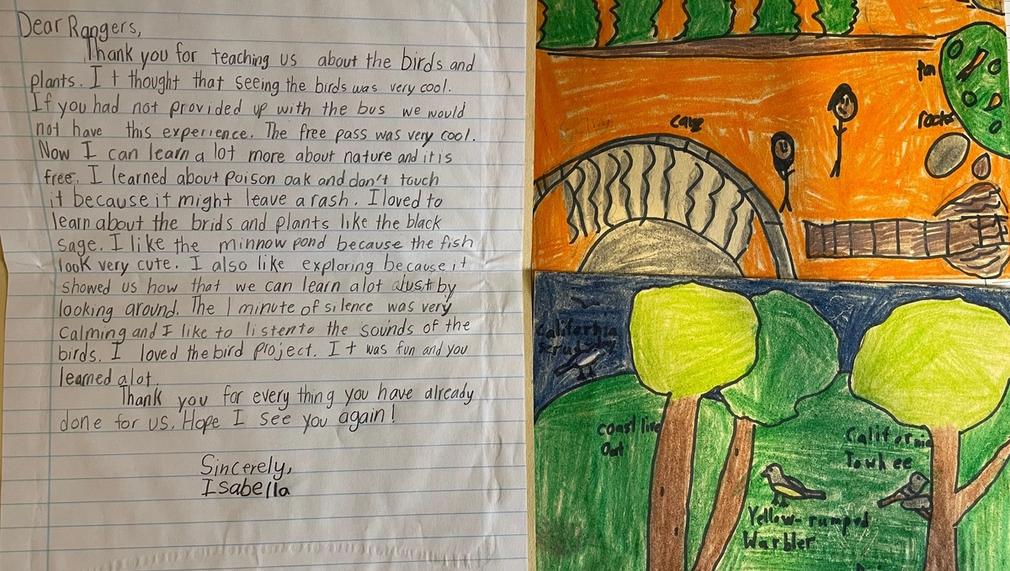Trailblazers: Environmental Education & Leadership Development for Underserved Youth
The Trailblazers initiative addresses a critical need for comprehensive environmental education and leadership development among underserved youth in the Santa Monica National Recreation Area. Despite the ecological significance of the SMMNRA, many young individuals from low-income and minority backgrounds lack access to quality educational opportunities that connect them with nature and inform them about environmental conservation. Trailblazers provides a vital lifeline, ensuring equitable access, paid internships and resources for all.

What is the primary issue area that your application will impact?
K-12 STEAM education
In what stage of innovation is this project, program, or initiative?
Expand existing project, program, or initiative (expanding and continuing ongoing, successful work)
What is your understanding of the issue that you are seeking to address?
The Trailblazers initiative addresses critical gaps in personal development and environmental education for low-income and at-risk youth. Many of these young people face barriers such as economic constraints, lack of transportation, and limited exposure to nature and nature-focused career paths, which result in underrepresentation in environmental fields and a missed opportunity for personal growth and community engagement. Trailblazers provides a vital lifeline for these youth, offering them transformative experiences, career development, and hands-on support in public land management, recreation leadership, wildlife research, botany and more. By equipping young people with the knowledge and skills necessary to protect and preserve the natural world, SAMO Fund not only enhances the lives of individual participants, but also contributes to the long-term sustainability and resilience of the Santa Monica Mountains ecosystem for generations to come.
Describe the project, program, or initiative this grant will support to address the issue.
SAMO Fund operates in close collaboration with the National Park Service (NPS) to develop and implement programs that address key aspects of conservation, education, and cultural preservation within the Santa Monica Mountains National Recreation Area (SMMNRA). Our flagship programs, including Open Outdoors for Kids (OOK), SAMO Youth, SAMO College Youth Leadership/College Internship Program, Oxnard Youth Ecologists (OYE) Program, and Girls Outside e Afuera!, amongst others, provide a diverse array of opportunities for youth engagement and leadership development. Through partnerships with the NPS, local school districts, and various organizations, we leverage expertise and resources to maximize the impact of our initiatives and ensure the holistic development of participants.
By engaging with over 25,000 youth annually, particularly those from Title I schools and diverse backgrounds, The Trailblazers Initiative aims to bridge gaps in environmental education and ensure equitable access to the resources and beauty of the Santa Monica Mountains. Additionally, SAMO Youth program’s commitment to diversity and inclusion is evident in its workforce programs, where over 90% of interns come from BIPOC backgrounds, empowering emerging environmental leaders from underrepresented communities.
Describe how Los Angeles County will be different if your work is successful.
The success of our programs means that every child in Los Angeles, regardless of their socioeconomic background, will have equitable access to nature and gain a deep appreciation for the environment. Trailblazers envisions a county where all students have equal opportunities for transformative learning experiences. By targeting Title 1 schools and prioritizing under-resourced communities, we aim to bridge the nature gap and ensure no child is left out in accessing the benefits and joys of outdoor education. In the long term, Trailblazers seeks to not only inspire a generation of environmentally conscious individuals, but provide vital economic mobility and work opportunities for low-income and BIPOC communities. We need the next generation to understand the importance of protecting and preserving our natural resources, and believe they deserve well-paid opportunities to do so. As the program demonstrates its effectiveness, it will serve as a model for other regions.
What evidence do you have that this project, program, or initiative is or will be successful, and how will you define and measure success?
Over the years, Trailblazers has grown in both size and impact. "SAMO Youth" is the bedrock of our education and leadership initiatives. The first program of its kind in the NPS, this tackles historical lack of equitable paid work experience for first-generation BIPOC seeking career experience in conservation, recreation and parks management. Although only available to 22 students a year, we receive over 100 applications, and offer paid internships, mentors, hands-on experience and career training for our participants. Our Open Outdoors for Kids brings over 24,000 4th graders into nature, many coming from Title 1 schools that otherwise wouldn't have funding for outdoor education. Over 90% of participants in OOK come from low-income communities of color. Many former interns now provide leadership in the Open Outdoors for Kids program and serve as a cultural resources and Spanish language interpreters. Coming full circle, SAMO Fund now employs several program alumni.
Describe the role of collaborating organizations on this project.
The SAMO Fund provides administration, fundraising support, and grant management for programming. SAMO staff help to recruit and train interns and volunteers, schedule programming and coordinate transportation and course materials.
The National Park Service provides educational and staff leadership to manage the team and the program budgets. Educational staff manages interns/volunteers, conducts distance learning and hybrid programs, and supports teacher and program needs. CA State Parks also provides educational and programmatic staff leadership to manage the team and the program budgets. Educational staff manages interns/volunteers and the distance learning programs. The Resource Conservation District provides additional educational staff student transportation logistics.
Approximately how many people will be impacted by this project, program, or initiative?
Direct Impact: 40,250.0
Indirect Impact: 100,000.0